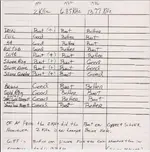Yes, but those would be air testing results. Important information, but not complete information. Next, you have to consider ground minerals which exist everywhere in some amount. I dont argue the results in the list you posted just the real-world application. The ground minerals can do 2 different things. It can become energized and return a signal which must be cancelled out (losing depth), or it can silently absorb the signal, and still reduce depth. SO, if your ground is extremely low in mineralization, I can see having an advantage with the lowest freq possible. For the majority who have more minerals to deal with, I dont think they would see an advantage, and probably a loss in depth.
Ok, just hold on a minute.
That text, there at the top.
Ir reflects the work, testing, and evaluation, of "George Paine".
May as well call him "King George" for all what he has brought to fore.
Yes, but those would be air testing results
The second paragraph clearly reads:
"Through rigorous testing procedures and scientific analysis",..........
I don't read that as "air testing".
You can be assured that the typical variables were part of the testing.
*
That top information in text was the information I said I would come back and post.
That 2nd document, in hand writing, I had filed in the same place.
I'm not 100% sure who's handwriting it's in. I'll look at my notes and see what I can.
It's either, George Paine, Dave Johnson, Allen Cannon, someone like that.
Iron Buzzpost
I assume you are referring to Sanman's post, in which case, he is simply talking about which frequencies favor which metals. The way I understand it, at least, he isn't saying anything about depth, although he did not define what he means by "best"... deepest, loudest... what?
I believe it could have been just straight up signal strength.
(a good solid/loud signal at said distance)
However, there is a direct correlation between frequency and depth. Lower frequencies travel further, whether its the bass from that kid's trunk woofer in the car next to you at the stoplight, or a metal detector. High frequencies die out much quicker (shallower).
100% correct
What Mr. Iron may, or may not know, is how "destructive" low frequency waves can be.
Like the "ventilator incident" in France.
Or when soldiers "march" across a bridge, instead of "break up the step".
What concerns me most about those findings in his post is that iron and silver both ring up "best". That's fine in a place with low iron mineralization in the soil and few nails and other iron junk, but in other cases, running a low frequency to look for silver among iron may not be the best idea.
Those two metals can be set apart by their "conductivity".
There are a few good machines that do that real well.
Silver would stand out like a sore thumb.







 It takes me time...thanks!
It takes me time...thanks!